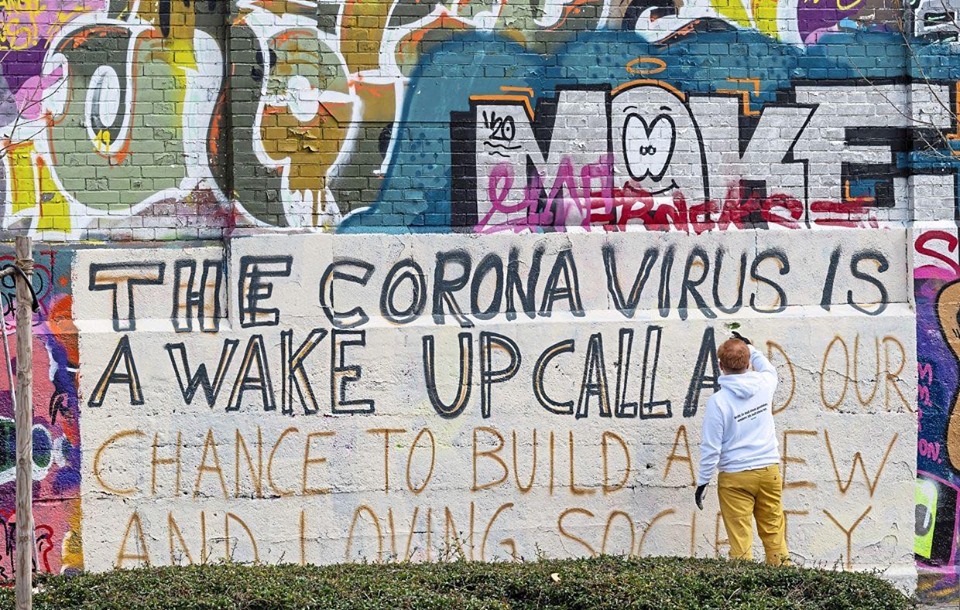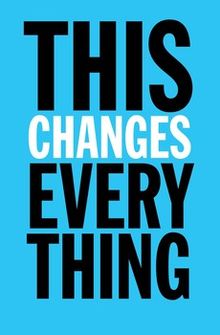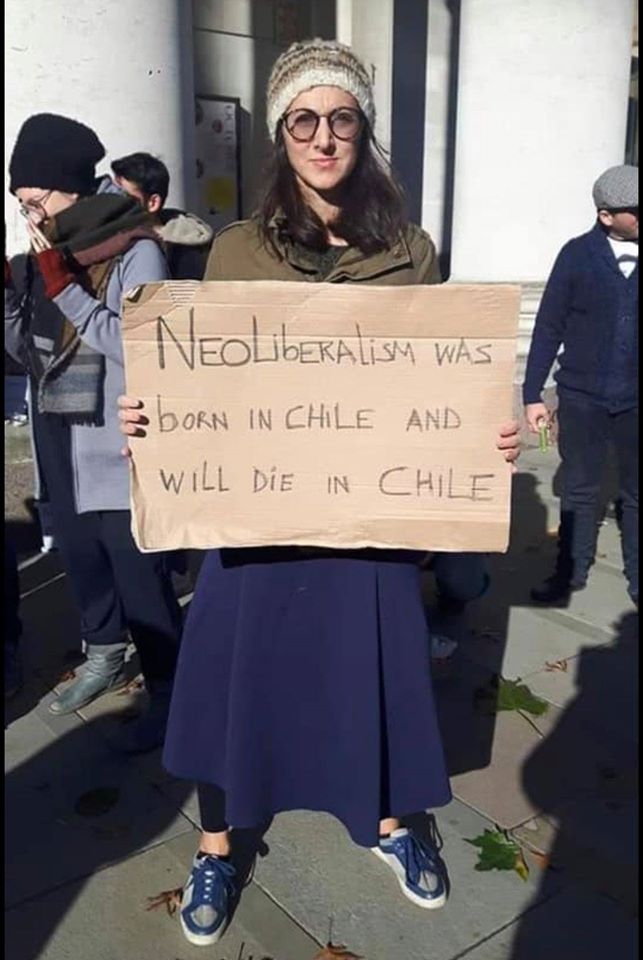“Look closely at the present you are constructing:
it should look like the future you are dreaming.”
― Alice Walker
There are no precedents for what is happening to us now, there just aren’t. Of course, we’re looking back at the great calamities that happened during our recent history. We compare this pandemic to the Spanish Flu, causing more deaths in 1918 – 1919 than the four years of war that came just before, or we compare the worldwide mobilisation that is happening now to the mass mobilisations of World War II. Although some things might seem similar, none of these comparisons fully hold true. During the four years of Nazi-occupation in Paris the cafés, theatres, and cabarets stayed open to the public. The show did go on. Now the grand avenues are deserted, and chairs are piling up behind the windows, unused.
But when history cannot provide us with answers, there is always still fiction. We recognise what we are seeing now, before our very own eyes, from the dystopian disaster movies we were flooded with during the past decenniums. The hefty speeches of the world’s political leaders, the rows of military vehicles rolling into our urban landscape, theempty streets where every sounds gets amplified by echos, the panic-buying of groceries, and the leading role of toilet paper that no scifi author could’ve imagined.
We should realise how most of us don’t even have the possibility right now to reflect and think about our past, present, and future. Having the time and space for philosophy is a luxury when survival is at stake. We are more than busy enough. Worrying about our sudden loss of income. Trying to keep some structure in the disrupted upbringing of our children, dealing with the relentless barrage of emails sent by a supervisor now measuring his or her efficiency in transmitted megabytes. Being stuck between the walls of a way too small apartment. Or worse.
Having no roof above your head at all. Being forgotten by a government that doesn’t consider you worthy of humane attention. Being brutally evicted from your living space. Being moved from your cell in a closed center to the empty wilderness of a city you have never seen before.
“Es ist wahr: ich verdiene noch meinen Unterhalt
Aber glaubt mir: das ist nur ein Zufall. Nichts
Von dem, was ich tue, berechtigt mich dazu, mich satt zu essen.
Zufällig bin ich verschont. (Wenn mein Glück aussetzt Bin ich verloren.)
– Bertolt Brecht
During the first weeks of this crisis we keep our hearts and spirits up thanks to the solidarity that is here. From our balconies we applaud the heros risking their lives every day in the hallways of hospitals. We can’t imagine the scenes taking place there. We learn, once more, how taking care of each other forms a fundamental part of our nature. In each and every hell, bits of paradise are being built by people we don’t know. Every disaster provides proof for the defeat of social Darwinism, that nefarious theory that dares to claim that we, human beings, are always monsters to each other. Surely there are some monsters in this society, but those are still exactly the same as before this viral outbreak.
Force of habit
During times of shock we tend to try and maintain our habits, our routine, our habitual modes of thinking as best as possible. By giving us something to hold on to, habits help us deal with the fear of these uncertain times. But force of habit is a bad advisor when everything is changing.
This changes everything. Six years ago, these three words were on the cover of Naomi Klein’s book on the climate crisis. During these past weeks we’ve been repeating them as a mantra. Nothing will ever again be the way it was before. From now on even the same shit will be a thousand times worse. What was unimaginable to us just some weeks ago is happening now, before our own eyes.
Remember how we commented on the measurements China took, just a couple of weeks ago? In Februari, Belgian newspaper Le Soir reported on how drones were sent out in Wuhan, to warn people to stay inside their homes: a ‘disturbing’ precedent in a country where civil liberty and privacy is already under constant threat. One month later this very same newspaper is applauding similar usage of drones like this in the city of Brussels.
Of course, we are all hoping this will blow over soon. China and some other countries have proven the epidemic can be brought under (temporary) control. But scientists have warned us this crisis might last for 18 months too. Since that is the time it takes to develop a vaccine and bring it to market. This doesn’t necessarily mean those18 months will look like the of lockdown measures we’re experiencing at the moment, but it does mean, without any doubt, that our lives and societies will continue to be disrupted for the foreseeable future.
We can’t predict exactly how this will impact our lives. We only know for sure that there will be long-lasting shocks to the global capitalist system. According to us, three possible outcomes are likely. We base these scenarios on crises that have happened in the past, not because historical circumstances are comparable (as explained in the introduction), but because it can teach us something about how this world’s elite, the 1%, reacts to these kind of shocks.
The way governments and central banks around the globe are reacting to the economic effects caused by the corona-outbreak inevitably recalls their reaction to the financial crisis of 2008. Both the EU and the USA then spent billions of money to placate the stock markets and bail out the banks. Since whole branches of our economies are struggling now, because of disrupted supply lines and in some cases temporary closure, an economic recession is inescapable in most countries (recession occurs when the growth of the GDP is negative during two or more consecutive quarters). The risk of a depression, a long period of economic decline, is increasing by the day.
The crisis that never left us
The corona-pandemic isn’t hitting a stable, booming, and fair economy. The economical system that gave us the financial crash of 2008 has been patched up, but not reformed. Within this system a next crisis is always lurking behind the corner. We’re still recovering from one exploded bubble while a new one is already seducing speculators. The same recipe is being used now as in 2008. Bail out the companies. (A bail out is when a government uses tax-money to save private interests).
Money is being pumped into the economy in massive amounts. Shareholders are being handed billions directly by our governments. CEO’s line up for an appointed at the White House to get their cheque. Airlines are asking for 50 billion. Aircraft manufacturer Boeing alone wants 60 billion. Casino’s are hoping for a cheque of 18 billion. The hotel-sector – where Trump has a stake himself – would be entitled to 150 billion.
One of those companies, American Airlines, made billions of profit during recent years. That profit wasn’t invested to create a buffer for difficult times (‘I don’t think we’ll ever record financial losses again’, their lunatic CEO said in 2017). What the company did instead was use those billions to buy back a lot of their own shares, so stock prices would skyrocket, dividends would rise, and the remaining big shareholders could rake in the profit. In Belgium, Brussels Airlines, though they are owned by the German company Lufthansa, already asked the government for 200 million.
Austerity, austerity, austerity
Anyone depending on government benefits at some point during the past 10 years, anyone working for a government service, or working in the social or cultural sector knows what the price was we paid for those bailouts. 10 years of austerity, 10 years of deep cuts that made those sectors we need most right now ill-fully unprepared. One example says it all. For a long time, Belgium had a strategic supply of surgical face masks. In 2009, one year after the financial crisis, the government stopped replenishing this supply out of budgetary reasons. In 2019 whatever remained of the supply was destroyed because the expiry date had passed. This wasn’t reported in the media, it was just a tiny detail in the auterity-budgets, a way of hiding many small and larger dramas. Think of that next time you’re out on your balcony cheering and applauding.
The Dutch government announced that it will allow the budget deficit to go up to 65 billion in order to save companies in need. As a first measure… because this number is also based on the hope that everything will blow over soon. 65 billion euro, that is an amount as big as all the budget cuts of the past 10 years combined. The dramatic budget cut of 200 million the Dutch cultural sector had to suffer in 2011, nothing more than breadcrumbs that are swept clean off the table now. And when this health crisis is over, austerity will start all over again. Another ten years of severe cuts for those sectors that are already struggling to survive now?
Here in Belgium we are heading straight towards budget cuts so extreme we will soon become nostalgic for the retro-austerity of the 2010s. Whilst only some months ago Wouter Beke, our minister of welfare, public health, family, and poverty reduction, declared it was impossible to find the extra 5000 euro needed to keep operating our suicide prevention hotline, now billions are made available for private companies like it is nothing. Flemish prime minister Jambon and his colleagues are already rubbing their hands togethers, eager for the ax they’ll soon get to grab to further chop apart our welfare state. If we let them act unchecked, all that awaits us will be a social massacre.
This is the scenario they are hoping for. They expect the old recipes to continue to work and they expect that we, the people, to be still numbed and paralysed enough by the pandemic to submit to this peacefully. A return to business as usual, as quickly as possible. But a couple of things aren’t taken into account by this reasoning. First of, it is almost certain that the coming economical crisis will be much more severe than the one of 2008. More importantly, today’s world population isn’t the same as it was twelve years ago. A wave of protests has taken the world by storm, and across all continents mass movements are gathering.
In October the government of Chile was forced to declare a state of emergency, out of fear that a growing protest movement might topple those in power. One of the protestors held up a sign: ‘Neoliberalism was born in Chile, in Chile neoliberalism will die’. We saw the yellow vest movement in France. Algeria and Sudan saw the forced resignation of their so-thought presidents-for-life. On one specific day, up to 20% of the total population of Lebanon was out protesting in the streets, with revolutionairy DJ’s encouraging them with music pouring down from the balconies. In the USA we see the mass movement that is reinforcing itself around Alexandria Ocasio-Cortez and Bernie Sanders, growing from roots planted in movements such as Occupy, Black Lives Matter, and the Women’s movement.
There is no alternative
Secondly, this is a fundamentally different crisis than the one of 2008. Governments are being forced to take much more radical measures than they did then. The newly elected Spanish government had to renationalise private hospitals. In Paris hotels are being seized by the local government to provide shelter and self-isolation to the homeless. Even Boris Johnson had to renationalise the railways, because the private companies that were operating them were about to collapse. Belgian minister of internal affairs Pieter De Crem sent the police to a company in Charleroi to confiscate the 180000 coronatests they had in storage. The company’s plan was to withhold the test-kits until they had found the highest bidder worldwide. Pieter De Crem, ex-minister of military, seizing private goods according to definitions written by Karl Marx on the ‘dictatorship of the proletariat’. This changes everything.
In the USA the discussion about paid-sick leave (unavailable to millions of USA workers) has exploded. Numerous countries have announce emergency measures to compensate loss of income. In Flanders, those who are temporarily unemployed get a 200 Euro bank transfer from the government to cover their water- and energy-bills. Christian-Democrat party CD&V already proposed the idea to give 1500 Euro as compensation to each family. In the USA Bernie Sanders is proposing a similar compensation of 2000 dollar.
A new society
There is another scenario to consider. When the horror of World War II ended in 1945, Europe and the USA didn’t simply return to the chaotic state of the 1930s. When business-owners and labour-unions formed a social pact in 1944, it became the basis of Belgium’s system of social security. Recipes used by the union’s local sick-leave and unemployments funds were now implemented nationwide. Afro-american soldiers returning home from the European front refused to ‘re-accept’ segregation and Jim Crow-laws (a story told by the movie Mudbound). Women who had spent four years working in factories while the men were fighting at the front, refused to re-accept their roles as stay-at-home mothers. It is in these immediate post-war years that the seeds for the civil rights and the women’s rights movement were sown.
In 1945 radical structural change was occurring throughout the societies of Europe and the USA. And this time as well, new recipes are ready, available, and waiting to be picked up. There is the Green New Deal proposed by Ocasio-Cortez. Europe too is teeming with already elaborated ideas of how to achieve ‘climate justice’ through a transition towards a more ecological, caring, and fair society. Why should the UK hand back the railways it is now nationalising to a new highest bidder or the same incompetent hands? If, in a few months, governments around the globe are the owners of airline companies they saved, why then not use this as the most efficient moment to radically restructure these services and facilities, and adapt them to a world where ecological impact is taken into account?
The share prices of the USA’s four biggest oil companies are right now at such a low that the government could buy them all for 300 million dollar. Instead of leaving the future of these companies and the 1,6 million people they employ in the hands of dividend-hungry shareholders that will continue to compete until every last drop of oil is squeezed out of each and every fracking bed, the government could ensure crisis-free transition both towards a more sustainable energy sector, and a professional future for those now employed in the oil-industry. If governments can find the means to guarantee a source of income for (certain parts of) the population during a time of crisis, then why shouldn’t it be possible to do this for the whole population during times of ‘peace’? If suddenly we can differentiate between essential jobs that we need to keep things going and the bullshit jobs that go on lockdown, then how could we possibly forget this once the crisis is over? In Vermont and Minnesota grocery store-workers are now recognised as ‘emergency workers’, and receiving added social benefits. Why on earth would they return to their old status in 18 months, a status that was underpaid and vastly under-appreciated within our society. Why on earth would we ever again allow a politician to propose budget cuts in our healthcare systems?
My sister,
From one island to another
I give to you these rocks
as a reminder
that our lives matter more than their power
that life in all forms demands
the same respect we all give to money
that these issues affect each and everyone of us
None of us is immune
And that each and everyone of us has to decide
if we
will
rise
–Kathy Jetñil-Kijiner and Aka Niviâna
Most of the measures governments are taking now, come straight out of the manuals of the political left. This should not surprise us as these measures are meant to prepare us for the much larger crisis heading our way. What we are experiencing now will be nothing compared to what awaits us if we don’t succeed in structurally reducing our CO2-emissions. This is the time to push forwards and demand the maximum of what is possible. Or as climate-journalist David Roberts puts it: “This crisis is a tragedy, but the bigger tragedy would be not to learn anything from it.” Naomi Klein has been warning us for years about the shock doctrine employed by the political right during times of crisis. The time is now for a shock doctrine of the left.
Fragile states
Things fall apart; the centre cannot hold;
Mere anarchy is loosed upon the world,
The blood-dimmed tide is loosed, and everywhere
The ceremony of innocence is drowned;
The best lack all conviction, while the worst
Are full of passionate intensity.
– William Butler Yeats
The danger of a third scenario looms. The existing system collapsed in several countries between 1917 and 1933. There is a risk that that might happen again. In a number of countries, authoritarian leaders are abusing the crisis to finally put an end to the last remnants of the rule of law. In Hungary, a law is on the table that would give Orban unlimited powers. Parliament would be set aside indefinitely. The new law also provides for prison terms of up to five years for anyone who publishes information that hinders or is considered ‘false’ by the government.
In many African or Latin-American countries there is almost no welfare system or social security at all. A prolonged lockdown in these countries would for most automatically lead to hunger, as all forms of income would disappear. A new debt-crisis would very likely push some countries into default and disaster. And as the European Union is bickering amongst each other, it’s Cuba and China that are sending out their medical teams to the world. The Czech Republic recently confiscated 100.000 face masks that were on their way from China to Italy. Within the EU, it’s each for their own, and all against the immigrants that are living under appalling conditions in the many camps on the continent’s border. The USA intensifies it’s economic sanctions against Iran, at a time when the country’s 81 million inhabitants are suffering under the same global pandemic. These shameless acts of inhuman cruelty are in stark contrast with the remarks made by Yanet Platero, coordinator of the organisation of Cuban Italians, when a medical team from her country of birth arrived at the airport of Milan. ‘Doesn’t Cuba need these doctors at home’, a journalist asked. ‘Our land does not offer what it has left over, our nation shares what it has’, Platero replied.
There are many beautiful things we can learn from this crisis, let Platero’s remark be one of them. Let it also sink in – here in the west – that living in fear of diseases and disruption is the ‘normal’ situation for half of the world’s population. The fact that we didn’t live with this awareness meant that the corona virus did not bother us as long as it stayed in China. So let’s make crystal clear the difference between what is good and what is bad for us now. Let’s give the monsters no chance this time. 2008 – bail out the system. 2020 – bail out the people.
Rachida Aziz and Christophe Callewaert
(translation Maarten VDB)




4 thoughts on “Corona crisis: This system cannot survive it, we can”
Comments are closed.